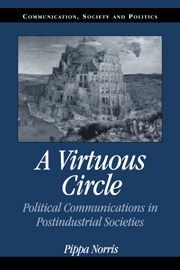Book contents
- Frontmatter
- Contents
- List of Tables
- List of Figures
- Preface
- PART I THE NEWS MEDIA AND CIVIC MALAISE
- 1 The News Media and Democracy
- 2 Evaluating Media Performance
- 3 Understanding Political Communications
- PART II TRENDS IN POLITICAL COMMUNICATIONS
- PART III THE IMPACT ON DEMOCRACY
- CONCLUSIONS
- Technical Appendix
- Notes
- Select Bibliography
- Author Index
- Subject Index
1 - The News Media and Democracy
Published online by Cambridge University Press: 26 February 2010
- Frontmatter
- Contents
- List of Tables
- List of Figures
- Preface
- PART I THE NEWS MEDIA AND CIVIC MALAISE
- 1 The News Media and Democracy
- 2 Evaluating Media Performance
- 3 Understanding Political Communications
- PART II TRENDS IN POLITICAL COMMUNICATIONS
- PART III THE IMPACT ON DEMOCRACY
- CONCLUSIONS
- Technical Appendix
- Notes
- Select Bibliography
- Author Index
- Subject Index
Summary
Recent years have seen growing tensions between the ideals and the perceived performance of democratic institutions. While there is no ‘crisis of democracy’, many believe that all is not well with the body politic. Concern in the United States has focused on widespread cynicism about political institutions and leaders, fuelling fears about civic disengagement and a half-empty ballot box. The common view is that the American public turns off, knows little, cares less, and stays home. Similar worries echo in Europe, particularly at the supranational level. Commentators have noted a crisis of legitimacy, following the steady expansion in the power and scope of the European Union despite public disengagement from critical policy choices. An important indicator is plummeting turnout in European elections, falling to less than half the electorate in 1999, down from three-quarters two decades earlier. The growth of critical citizens is open to many explanations, as explored in a previous study, including the failure of government performance, changing cultural values, and problems of institutional effectiveness.
One common explanation concerns developments in political communications. During the past decade a rising tide of voices on both sides of the Atlantic has blamed the news media for growing public disengagement, ignorance of civic affairs, and mistrust of government. This idea has developed into something of an unquestioned orthodoxy in the popular literature, particularly in the United States. A related viewpoint, more prevalent in Europe, regards the growth of professional political marketing by parties as also contributing towards greater public cynicism.
- Type
- Chapter
- Information
- A Virtuous CirclePolitical Communications in Postindustrial Societies, pp. 3 - 21Publisher: Cambridge University PressPrint publication year: 2000
- 1
- Cited by



